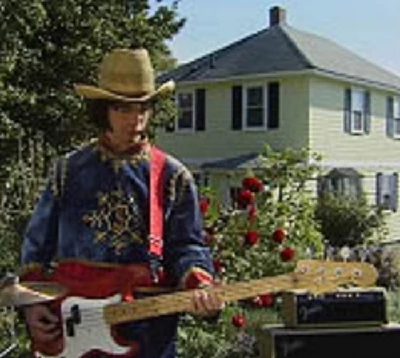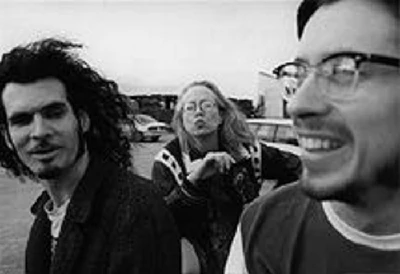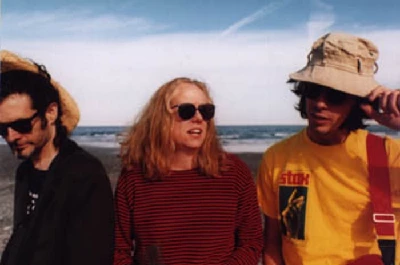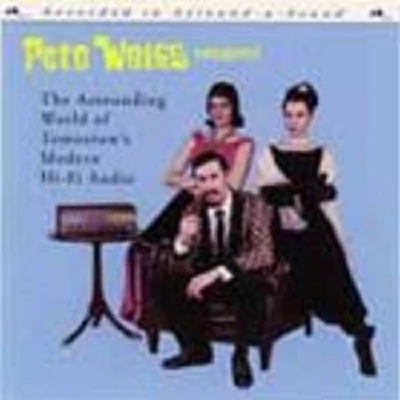published: 13 /
1 /
2002

Pete Weiss is one of the most important and influential members of the Boston independent music scene. An established and highly respected record producer, mixer and engineer, he is the co-owner of Zi
Article
Pete Weiss is one of the most important and influential members of the Boston independent music scene. An established and highly respected record producer, mixer and engineer, he is the co-owner of Zippah Studios which he founded in 1989, and has worked with acts that include ‘The Willard Grant Conspiracy’, Charlie Chesterman, ‘The Magdalenes’, ‘Kustomised’, Vic Chesnutt, ‘Weeping in Fits and Starts’, Paula Kelley, ‘The John Huss Moderate Combo’ and former ‘Velvet Underground’ members, Moe Tucker and Doug Yule. He is also a talented multi-instrumentalist and songwriter, and has released two albums. The first of these, a solo record, ‘The Astounding World of Tomorrow’s Modern Hi-Fi Audio’, came out on ‘Noisy Revolution Records’ in 1996, and the second, an eponymous album recorded with his group ‘Pete Weiss and the Rock Band’ was released on ‘Reverse Curve Records’ (now ‘Section 304 Records’) in 1998.
During his teens Pete Weiss played in various garage rock groups, but from an early age also had an interest in recording. “I was always interested in recording to some degree” he reflects in an interview with Pennyblackmusic. “I was always playing with little tape recorders when I was a kid, making radio plays and just recording rude sounds with my friends”. In 1984, his freshman year at college, Weiss bought a four track cassette recorder . “They had just recently come out affordably and that changed everything. I was able to have a lot of fun, not only recording myself, but my friends and my band, and my enthusiasm for that became more than my playing.”
Weiss spent a year as an intern at a studio in Hartford, Connecticut, and gained his first production credit of note in 1985 working as a tape operator on sessions with the free jazz musician, Ornette Coleman.
He continued to “dabble in playing in rock bands” throughout his college years and in late 1987, during his final year as a student “scraped together some money and bought an eight track recorder, which was big deal at the time, and I would record bands. I would haul the thing to their rehearsal stage. It didn’t come out very well, but it was a learning experience.”
“ When I graduated from college I moved to Boston, and for a while I worked in regular office jobs, and at weekends and night time began recording with friends. It got to a point where we rented a small space and pulled our resources together and that became the first version of Zippah.”
Weiss’s original business partner at Zippah was Ken Thomas, a jazz musician and songwriter, but in more recent times has been Brian Charles, the frontman of local Boston band ‘The Rayloves’. “Brian and I have been friends for about ten years, and about four years ago he bought a share of Zippah. He has been a freelance engineer around Boston, and is also a great songwriter in his own right, and had been bringing a lot of business to Zippah, so we offered to sell him a share. He bought out Ken Thomas, who decided to start a family and get out of music.”
From its humble and small origins, Zippah has become in ten years one of the busiest and most prolific studios in Boston. Now much expanded in size , it offers both sixteen and twenty four track recording, and earlier this year added a mastering suite. Unusually for a modern studio, Zippah uses mainly vintage equipment, and its centrepiece is a custom built 1970s 36 channel Neve Console which was acquired from the BBC. It also has a Mellotron ; a variety of Gibson, Gretsch and Fender guitars ; an EMI strip once used in Abbey Road Studios, and various old-fashioned compressors, tube preamps and equalisers.
“I like the way the equipment sounds.” Weiss explains. “I think it creates a quality which is hard to get with some of the newer gear, although to be fair that is changing. It was also a business decision from a studio owner’s point of view. Recently it has become very easy for anyone to scrape together a few thousand dollars and to put together a pretty decent digital recording studio, and to make pretty decent sounding records. It seems that everyone has got one, so we also did it in order to create a niche. We can offer a higher quality vintage way of recording.”
Zippah’s unique recording facilities have proved popular in Boston, attracting many local bands, but also, as word has spread, acts from New York and New England, and as far away as Chicago, Atlanta and Washington DC.
As a result of Zippah’s busy schedule, both Weiss’s albums were recorded in scattered bursts, often when there were last minute cancellations or late at night when there were no other bookings.
‘The Astounding World of Tomorrow’s Modern Hi-Fi Audio’ , which now unfortunately has been deleted, is eclectic in style, encompassing a wide variety of musical genres, including garage rock, psychedelia, rock ‘n’ roll, rockabilly and country. In what has become Weiss’s trademark when recording his own music, the whole work is embodied with a quirky, often surreal sense of humour. The wacky lyrics and sound effects, though essential ingredients , are never, however, allowed to override the music, and the musical diversity and versatility on display and Weiss’s sense of innovation give it a depth and lasting appeal not regularly associated with ‘funny’ records.
“It is a theme record, and a kind of a concept record, and it is hosted by this recurring character. He is the narrator, and the idea that is implied is that the record takes place around 1960, so this guy is talking about all the wonderful new types of sounds and music that the future will bring us. He is a little pretentious about what is good audio and the more he talks the more you realise he doesn’t know what is going on.”
‘The Astounding World of Tomorrow’s Modern Hi-Fi Audio’ was co-produced by Brain Charles, who also coached Weiss’s singing. Weiss also plays bass, guitar,organ, piano, and drums on the record. He is backed by various other local muscians, and on several of its seventeen tracks Rich Schroder and Pete Woodward from the band ‘Zen Lunatic’ appear on guitar and drums.
Even before ‘The Astounding World of Tomorrow’s Modern Hi-Fi Audio’ was released, Weiss had formed The Rock Band in which, while occasionally switching instruments, he plays mainly the bass. The band also has in its line-up Emily Jackson on drums and Stephen Fredette on guitar. Jackson, who is originally from Indiana, was previously in all girl eighties band ‘Sally’s Dream’, who played support dates with ‘The Go Gos’ and ‘The Bangles’. Fredette was a guitarist in the Boston guitar rock outfit ‘Scruffy the Cat’, who toured with ‘The Replacements’.
Their 1998 album ‘Pete Weiss and the Rock Band’ once again blends musical versatility with humour and as well as having further garage rock, rock ‘n’ roll and country tunes, also contains fake jazz, blues, punk, grunge, surfing and guitar rock numbers. While most of the album’s songs are standard length two or three minute rock songs, some last only a matter of seconds and over a third of the record’s thirty six tracks last less than a minute ‘The White Album’ by ‘The Beatles’ is cited on the album’s sleeve as an influence. Another record which also had a dominant effect on the recording was ‘Frank Zappa and The Mothers of Invention’s’ 1967 album ‘We’re Only In It for the Money’.
“ ‘We’re Only in It for the Money’ was before Frank became obsessed with toilet humour.A lot of the satire (on ‘The Rock Band’ album) was influenced by that Mothers of Invention album.”
“ When the three of us get together and play, we don’t really rehearse that much and thrive on spontaneity. The three of us have pretty good senses of humour, I like to think, and we are all on the same wavelength as what we think is funny, or what we think is trying too hard to be funny.”
“We were very conscious of wanting to make it a funny, satirical record, but one that is also listenable and that is not necessarily a novelty record. There is certainly novelty moments on there, but we wanted to be careful about that”
The album has guest appearances from many of the musicians Weiss has produced at Zippah. Rich Schroder and Pete Woodward appear again, and the album also features Brian Charles, Ken Thomas, Charlie Chesterman, Paula Kelley, and ‘Morphine’ saxophonist, Dana Colley .
On one track ‘Wulla Wulla(Velvety Smooth)’, a lullaby, Brother Cleve, the former keyboardist with ‘The Del Fuegos’ and now a member of the successful lounge act ‘Combustible Edision’, appears playing the obscure musical instrument, the Omnichord.
“ He has a collection of musical instruments, and one of them is this Omnichord thing, which was built by Casio just for a couple of years in the early eighties. It is is a sort of an electric, or electronic autoharp, with cheesy rhythms built in, and it was built so that you strum it. It was an early eighties attempt at making electronic music ‘expressive’. ”
The album also has on it ‘Robert Robbs’, the theme tune for an imaginary sitcom about Weiss’s postman, and Robert Robbs himself appears on three of the album’s tracks as a Master of Ceremonies.
The band are currently recording and mixing what will be their farewell CD‘Pete Weiss and The Rock Band’ : We’re an American Band’. Fredette has decided to take an extended break from music, and the group will amicably split up after a final show to launch the CD when it is released by Section 304 records later this year.
The new recording will combine “ five somewhat wacked sixties and seventies era covers” and also five original compositions. The covers will be T Rex’s obscure ‘Seagull Woman’, Frank Zappa’s ‘Bow Tie Daddy’ Cream’s ‘SWLABR’, Grand Funk’s ‘We are an American Band’ and The Beatles ‘One after 909’. ‘One after 909’ is sung in another language , but Weiss is leaving it to his listeners to work out which one. “It was very difficult for us to pronounce the words” he says cryptically, “ but I think we did it okay”.
Schroder and Woodward also feature on ‘Seagull Woman ’, and there are special guest appearances on the cover version of ‘We are an American band’ by Fredette’s brother, David , and former ‘Sugar’ drummer, Malcolm Travis.
Weiss and Jackson will continue to work together when the Rock Band finally finishes, and are currently putting together a new group. They are still working out details, but “the new band will be more vocally-orientated than the Rock Band and will play completely new material.”
In his production career, Weiss has been able to form strong ties with many of the musicians who have come into Zippah, and two of the acts who he has had especially long lasting relationships with are The Willard Grant Conspiracy and former Scruffy the Cat lead singer, Charlie Chesterman.
Both The Willard Grant Conspiracy’s last two albums ‘Flying Low’ and this year’s ‘Mojave’ were recorded with Weiss at Zippah, and with Chesterman he has worked as a producer or co-producer on all all four of his solo albums.The pair’s work has encompassed a range of musical styles , including rockabilly, blues, country, pop and punk. “We are good friends.” Weiss says about Chesterman. “ He really trusts my musical instincts, and I have a good appreciation for where he is at. We have got to a stage where we take it as it comes”. About Robert Fisher, the front man of The Willard Grant Conspiracy, who is also producer in his own right, he is equally flattering “Robert has been great about bringing any side projects or not-so-side projects for me to collaborate with. He is good too about being open-minded with respect to musical parts and instrumentation.”
In what has obviously been a great personal achievement, Weiss has also helped to bring back to the studio after a twenty year gap the former Velvet Underground bassist and singer, Doug Yule.
Doug Yule is a much maligned and often under-rated talent in music. He joined the influential group in 1968 after John Cale was fired and worked on the band’s latter two albums with Lou Reed ‘The Velvet Underground’ and ‘Loaded’. When Reed quit the act in 1970, he carried the band on, touring it as a more conventional rock outfit until 1973, and recording their last album, the much derided ‘Squeeze’, in 1972. He is often blamed by fans and critics for causing Reed to leave the band, and both for selling the group out to commerciality and for its eventual collapse. Weiss, however, has a broader and more sympathetic perspective on events.
“Lou Reed was going through a bad period ” he says. “I think there was personal hard feelings between him and Doug. Doug was in his early twenties at the time, and has admitted that he had a little bit of an ego, and was overjoyed to be given the opportunity to sing these Velvet Underground songs. He did lead on quite a few of them, and helping the songwriting.”
“I get the impression that Lou Reed felt he was being squeezed out, and wound up quitting, and Doug kept the band going for a little while. People historically look back on that, and it’s easy to say ‘Oh ! He killed it ! He flew out’, but that is not really the case. I think it is more complicated than that. A lot of it was to do with the fact that The Velvet Underground at the time were not making any money.”
“They were not really selling records. Doug was just trying to front a rock band that was trying to make a little money, and they were just trying to get their records out.”
Weiss first got into contact with Yule, after meeting Mo Tucker, The Velvet Underground’s drummer, at a recording session in a New York studio in 1994 at which she was playing with the band, ‘Magnet’.
“I was actually hired to do the drums and bass production. That was my credit. I basically did the drum sound, and worked with Moe getting the whole vibe going which was cool ”
Weiss got on well with Tucker- “We hit it off. She’s a nice person”- and asking her what Doug Yule was doing, learnt that since the collapse of his band ‘American Flyer’ in 1977, he had been working as a furniture maker in the state of Washington , but had recently started playing music again. After getting in touch, and hearing a demo, Weiss invited him to Boston in 1997 to record a three track EP.
The results of the full EP are still all to be heard, but one track “Beginning to Get It’, a strong and catchy county rocker, has already seen release on ‘A Place to Call Home’, a charity compilation disc of Zippah recordings for the Massachusetts Adoption Resource Exchange which Weiss compiled last year.
“He and his manager are still trying to find someone to put it out. There are a few labels that are talking about doing it. The three songs are part of a larger song cycle and ideally we would like a label to come up with a little financing to send them back into the studio to record these songs.” Weiss is still in regular touch with Yule and would like eventually to produce the larger project also.
As well as the Rock band album, and the Doug Yule record, Pete Weiss also has several other projects forthcoming. He has been back in the studio with The Willard Grant Conspiracy, who are between European tours, working on a five track EP. The debut albums of new acts ‘The Spurs’ and ‘The Coronet Premiers’, both of which he has produced, are soon to be released, and he has also been working on projects with one-time ‘Five Dollar Milkshake’ frontman, Jaime D’Almedia ; New York band ‘The Wobblies’, and former ‘Irresponsibles’ guitarist, Dave Thomas. After the recent success of ‘Mojave’ abroad, he is also hoping to work in Europe. In the meantime though, Zippah’s reputation continues to build , remaining as prolific as ever with bookings every day, and it seems that Weiss’s second decade in the business will prove to be as busy as his first.
If any artist or label has an interest in working with Pete Weiss, he can be contacted on email at peter_weiss@bostonbbs.org, or alternatively through the Rock Band’s website, which provides a full itinerary of his recent production work, at www.musearts.com/guests/pwrb
Picture Gallery:-


